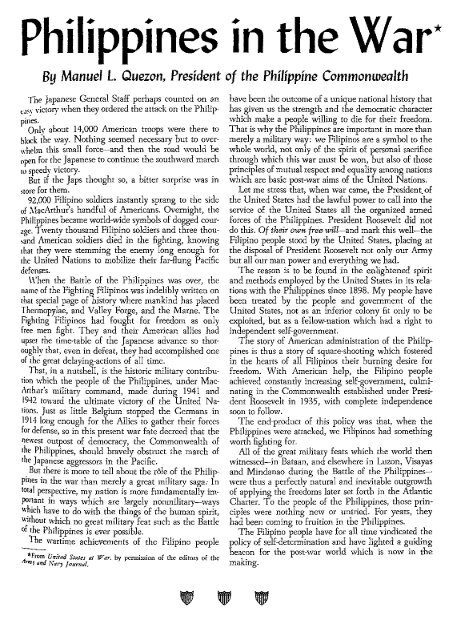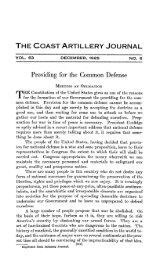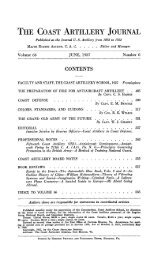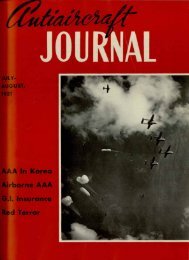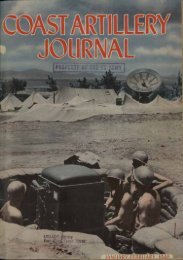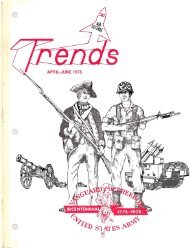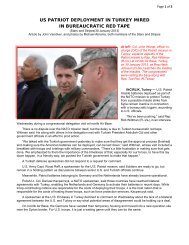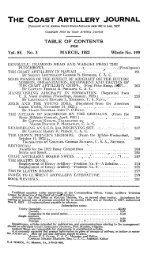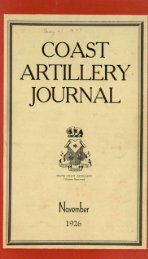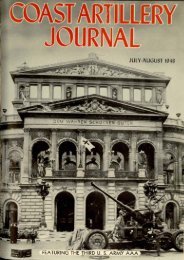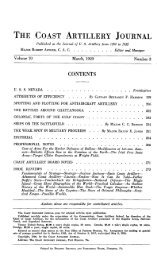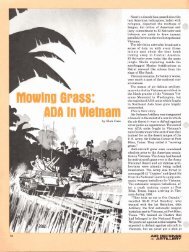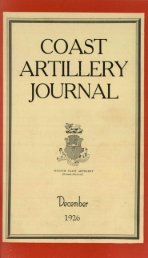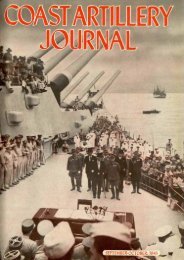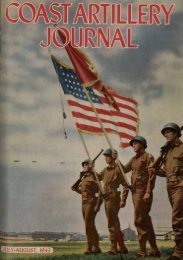January-February - Air Defense Artillery
January-February - Air Defense Artillery
January-February - Air Defense Artillery
Create successful ePaper yourself
Turn your PDF publications into a flip-book with our unique Google optimized e-Paper software.
Philippines in the War*<br />
By Manuel L. Quezon, President of the Philippine Commonwealth<br />
The Japanese General Staff perhaps counted on an<br />
eJ~Y victorywhen they ordered the attack on the Philippines.<br />
OnIv about 14,000 American troops were there to<br />
block the way. Nothing seemed necessary but to overwhelm<br />
this small force-and then the road would be<br />
openfor the Japanese to continue the southward march<br />
10 speedyvictory.<br />
But if the Japs thought so, a bitter surprise was in<br />
~torefor them.<br />
92,000 Filipino soldiers instantly sprang to the side<br />
of ~lacArthur's handful of Americans. Overnight, the<br />
Philippinesbecame world-wide symbols of dogged couraoe.Twentv<br />
thousand Filipino soldiers and three thou-<br />
I:> -<br />
~nd American soldiers died in the fighting, knowing<br />
that they were stemming the enemy long enough for<br />
the United Nations to mobilize their far-flung Pacific<br />
defenses.<br />
\\'hen the Battle of the Philippines was over, the<br />
nameof the Fighting Filipinos was indelibly written on<br />
that special page of history where mankind has placed<br />
Thermopylae, and Valley Forge, and the Marne. The<br />
Fighting Filipinos had fought for freedom as only<br />
free men fight. They and their American allies had<br />
upset the time-table of the Japanese advance so thoroughlythat,<br />
even in defeat, they had accomplished one<br />
of the great delaying-actions of all time.<br />
That, in a nutshell, is the historic military contribution<br />
which the people of the Philippines, under Mac-<br />
Arthur's military command, made during 1941 and<br />
1942 toward the ultimate victory of the United Nations.Just<br />
as little Belgium stopped the Germans in<br />
1914 long enough for the Allies to gather their forces<br />
fordefense,so in this present war fate decreed that the<br />
newest outpost of democracy, the Commonwealth of<br />
the Philippines, should bravely obstruct the march of<br />
the Japanese aggressors in the Pacific.<br />
But there is more to tell about the role of the Philippinesin<br />
the war than merely a great military saga: In<br />
totalperspective, my nation is more fundamentally impo~ant<br />
in ways which are largely nonmilitary-ways<br />
\\'~Ichhave to do with the things of the human spirit,<br />
WIthoutwhich no great military feat such as the Battle<br />
of the Philippines is ever possible.<br />
The wartime achievements of the Filipino people<br />
-If *From United States at 1l7ar. by permission of the editors of the<br />
'my al1d Nary Journal.<br />
have been the outcome of a unique national history that<br />
has given us the strength and the democratic character<br />
which make a people willing to die for their freedom.<br />
That is why the Philippines are important in more than<br />
merely a military way: we Filipinos are a symbol to the<br />
whole world, not only of the spirit of personal sacrifice<br />
through which this war must be won, but also of those<br />
principles of mutual respect and equality among nations<br />
which are basic post-war aims of the United Nations.<br />
Let me stress that, when war came, the President of<br />
the United States had the lawful power to call into the<br />
service of the United States all the organized armed<br />
forces of the Philippines. President Roosevelt did not<br />
do this. Of their own free will-and mark this well-the<br />
Filipino people stood by the United States, placing at<br />
the disposal of President Roosevelt not only our Army<br />
but all our man power and everything we had.<br />
The reason is to be found in the enlightened spirit<br />
and methods employed by the United States in its relations<br />
with the Philippines since 1898. My people have<br />
been treated by the people and government of the<br />
United States, not as an inferior colony fit only to be<br />
exploited, but as a fellow-nation which had a right to<br />
independent self-government.<br />
The story of American administration of the Philippines<br />
is thus a story of square-shooting which fostered<br />
in the hearts of all Filipinos their burning desire for<br />
freedom. With American help, the Filipino people<br />
achieved constantly increasing self-government, culminating<br />
in the Commonwealth established under President<br />
Roosevelt in 1935, with complete independence<br />
soon to follow.<br />
The ~nd-product of this policy was that, when the<br />
Philippines were attacked, we Filipinos had something<br />
worth fighting for.<br />
All of the great military feats which the world then<br />
witnessed-in Bataan, and elsewhere in Luzon, Visayas<br />
and Mindanao during the Battle of the Philippineswere<br />
thus a perfectly natural and inevitable outgrowth<br />
of applying the freedoms later set forth in the Atlantic<br />
Charter. To the people of the Philippines, those principles<br />
were nothing new or untried. For years, they<br />
had been coming to fruition in the Philippines.<br />
The Filipino people have for all time vindicated the<br />
policy of self-determination and have lighted a guiding<br />
beacon for the post-\var world which is now in the<br />
making.


